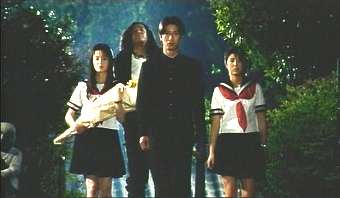![[Deep Focus]](../../flicker/longo.gif)

Kids today
![[Deep Focus]](../../flicker/longo.gif)
|
|
| Fudoh: The New Generation
|
|

|
B+ |
Kids today |
|
|
Movie Credits: Directed by Takashi Miike Written by Toshiyuki Morioka from the graphic novel by Hitoshi Tanimura Cinematography by Hideo Yamamoto Starring Shosuke Tanihara, Riki Takeuchi, Marie Jinno and Toru Minegishi Japan, 1996 Aspect ratio: 1.85:1 Screened on DVD Miike @Deep Focus: |
The movie that put Takashi Miike on the international scene is a darkly funny yakuza opus that’s wholly immersed in over-the-top Japanese pop culture. Based on a manga series, Fudoh: The New Generation is a simple, even clichéd, gangster yarn that’s peppered with enough deviant sex and graphic violence to nonetheless qualify as a singular experience. Shosuke Tanihara is Riki Fudoh, a high-schooler born into a Japanese mob family. Riki is repulsed by the ways of the mob—particularly his father, who after angering his yakuza bosses murdered Riki’s older brother in order to save himself. The younger Fudoh deploys a small army of assassins—schoolgirl strippers, primary-school hitmen—to take out the yakuza kingpins one by one as he plots to overthrow his father. Talk about your generation gaps. The animosity displayed here between the yakuza establishment and its younger counterparts prefigures the slicker, flashier Battle Royale (not to mention The Sopranos) by several years. Put in the context of Miike’s later achievements, this is a minor film, but one in which he begins exploring the attitudes toward contemporary Japan that will be a hallmark of his work. The director’s sympathies are clearly with young Fudoh, whose ruthlessness is born from disgust with his father’s betrayal of his own offspring. But Miike declines to take the high road. The link between sex and death, here exemplified in the high-school student who strips for a living and fires darts with her vagina, seems hardwired into his sensibility, as does his taste for depictions of abject brutality. Of the Miike films I’ve seen, Fudoh is closest in tone to Dead or Alive, another over-the-top wallow in base genre styles that, according to the Internet Movie Database, was released in Japan just before the deep and disturbing Audition, which deconstructs Japanese cultural attitudes toward gender relations. Taken together, those two films—the only two to receive a commercial theatrical release in the U.S.—show the two faces of Miike. One is that of a flashy, unrepentant provocateur with a fetish for transgression, and the other is of a genre artist whose great subject is his country itself. Fudoh makes as appropriate an entry point as any for looking at his career. Fudoh is available in the U.S. on a mediocre Tokyo Shock DVD. There are no menus or extra features; when you press play, several previews for other Tokyo Shock features begin rolling without explanation. The picture quality is adequate though obviously optimized for VHS with artificially sharp edges, a lack of detail, washed-out colors and too-high contrast, and the English subtitles are nonremovable. |
 http://www.deep-focus.com/index.html
bryant@deep-focus.com
http://www.deep-focus.com/index.html
bryant@deep-focus.com